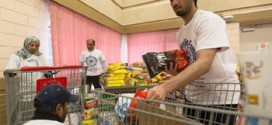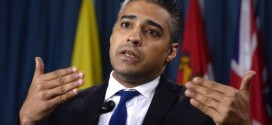Even before starting work as chairman of a United Nations human rights commission investigating Israeli war crimes in Gaza, Canadian law professor William Schabas has been vilified as an apologist for Iran incapable of setting aside his perceived anti-Israel bias.
Full page adverts have been taken out against him in The New York Times, Wall Street Journal and Washington Post, while the Facebook page of Rabbi Shmuley Boteach, a leader of the anti-Schabas campaign, has attracted more than 30,000 "likes".
The make-up of Schabas's commission is still being finalised - George Clooney's fiancee Amal Alamuddin turned down the invitation so another one or possibly two members must be found - but already he is worried about whether the team will be allowed to get into the region to conduct its inquiry.
"There is going to be an issue for the commission getting access, getting into Gaza and going to Israel," he told Reuters in an interview, speaking from his home in England, where he is a professor of international law at Middlesex University.
"Other fact-finding bodies of this nature have had difficulty in the past," he said. "I can't rule it out."
In the meantime, Schabas finds himself defending comments he has made criticising Israeli Prime Minister Benjamin Netanyahu, and explaining how can set aside his personal feelings about the Middle East to carry out a balanced investigation.
"We all have views about Israel, Palestine and things that have gone on in the past and we all have to put those things to one side," he said. "I'm determined to do that. The question is whether the person is capable of doing it. I think I'm capable of doing it and no one has any proof to the contrary."
HEAVY TOLL
The month-long attack on the Gaza Strip left more than 2,000 Palestinians dead, most of them civilians.
It was the deadliest attack on Gaza since Israel unilaterally withdrew from the territory in 2005 and included several incidents in which Israel was accused by rights groups of excessive use of force, war crimes or crimes against humanity.
In two cases, U.N.-run schools being used as shelters were hit by Israeli artillery, killing 25 people, and in another incident four boys playing on a beach were killed by shell fire.
Schabas would not be drawn on which events in the war would be most closely scrutinised, saying the commission had to be fully constituted first. But he made clear that the mandate was for a broad investigation, covering both sides.
Israel had already given "brief but nevertheless significant" explanations for some of its actions, he said. The aim would be to get more detail and clarity, from all parties.
"When we see young boys being killed on a beach, it may not be enough to say that we were acting in self-defence and we try to minimise civilian casualties," he said. "We need more detail to understand."
IRANIAN "TOADIE"
From Rabbi Boteach's point of view, there is nothing Schabas can say that will make his investigation credible.
Having once described Netanyahu as "the greatest threat to Israel" and declared him his "favourite" to appear before the International Criminal Court, Schabas is, in the minds of most Israelis, unfit to serve as an independent investigator.
His part-sponsorship in 2011 of a human rights conference in Iran alongside an organisation Boteach described as "fundamentalist and anti-Semitic" has enraged detractors.
The U.S.-based rabbi said in an interview "If he had any decency he would recuse himself. He doesn't like Israel and he hates its prime minister."
Netanyahu has not kept out of the fray either, saying that Schabas's inquiry has already been written.
"They have nothing to look for here. They should visit Damascus, Baghdad and Tripoli," he said last week.
World Bulletin / News Desk

 العربي الديمقراطي The Latest From The Arab World
العربي الديمقراطي The Latest From The Arab World




